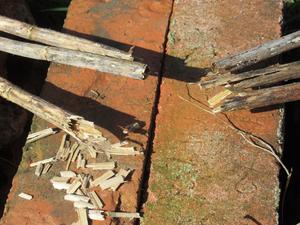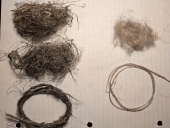




Living in Anjou , France,
For the many not for the few
http://www.permies.com/t/80/31583/projects/Permie-Pennies-France#330873




David Livingston wrote:I have read about Nettles being used to make Skeps and Baskets anyone have any details about this ?
What treatment would be needed?







 2
2




Juli Anne wrote:I have three good batches of nettles that I have carefully tended and I think this year I will be playing with them as a fiber source. I understand soaking is the way to rot away the non-textile part and just leave the fibers?











Hans Quistorff wrote:I was intrigued by the experience of the ants striping the outer coating. We have ants here that make large mounds of conifer needles and thy seem to be harvesting sap from various sources. I will try throwing nettles on the nest and see what happens. If they doo strip the surface I will also try my wild flax when it is tall but not flowering because the surface of the stems is still soft at that stage.
Anothe question is there usable fiber in the stems of field daisie flowers that I am cutting at this time to keep them from seeding?











Living in Anjou , France,
For the many not for the few
http://www.permies.com/t/80/31583/projects/Permie-Pennies-France#330873




David Livingston wrote:Hi Raven
The impression I was given was that the binding was always bramble ( aka. Black berry ) not nettle. It was the hive itself that was either nettle rye rushes or a type of wild grass I have yet to ID here in France
David











www.MicroEcoFarming.com
www.RegenerativeAgrarian.com




David Livingston wrote:Hi Raven
The impression I was given was that the binding was always bramble ( aka. Black berry ) not nettle. It was the hive itself that was either nettle rye rushes or a type of wild grass I have yet to ID here in France
David
"Also, just as you want men to do to you, do the same way to them" (Luke 6:31)
 3
3





















raven ranson wrote:I suspect there were many right ways to make a skep. ... Sometimes I find it scary when I go on the internet and find that there is only "one proper way" to make something when historically, people would have successfully made things out of what materials they had to hand. ... there are many right ways to do something. The only way we will discover what works for us is to observe and interact.
"Also, just as you want men to do to you, do the same way to them" (Luke 6:31)
 1
1




Best luck: satisfaction
Greatest curse, greed
 2
2




Retting, as it is practiced for flax and hemp, is an unhealthy operation: it
produces pestilential fumes and must be banished from industry. It has, moreover,
the fault of altering the fibers, when it is not conducted with the greatest
care. The decortication of the stalks of the nettle may, it is true, be effected
by mechanical means, without prior retting, on condition that the stems have
been dried. But this result can not be obtained in all seasons: it requires special
climatic conditions; And one would expose oneself to seeing a crop rotten, for
want of a time favorable to its desiccation. The Government of the British
Indies has therefore offered a premium of 125,000 francs for the best machine or
the best process for the green treatment of ramie stalks.
The problem is now solved: The newly harvested ramie rods are subjected to the
action of steam or hot air in closed vessels, in wooden cases, for example. At
the end of a few minutes, the flesh separates with the greatest ease from the
cortical layer containing all the usable fibers. The bark is removed by strips
free of any woody debris, and, on the other hand, no parcel of filament remains
on the core.
This method of treatment was discovered by Mr. A. Favier, a former student of the
école polytechnique.

 1
1




Google Translate did a pretty good job but it had trouble with "chènevotte" and I'm not familiar with the word.
Hans Albert Quistorff, LMT projects on permies Hans Massage Qberry Farm magnet therapy gmail hquistorff






 1
1





"Also, just as you want men to do to you, do the same way to them" (Luke 6:31)






 1
1





"Also, just as you want men to do to you, do the same way to them" (Luke 6:31)




Inge Leonora-den Ouden wrote:it looks like fiber now, at least 'spinnable' ... a pencil is my 'tool' for experimental spinning very small amounts of fiber










Len Ovens wrote:... How does it "feel"? It looks rough, but that may not be an issue depending on how it is used.
How does it smell when mixed with human sweat? I have found that cotton handles sweat better than plastic (whatever the exact name may be) which smells really bad after just a few hours of work. I have found that wool has less smell than cotton when used for socks. I am told buck skin (brain tanned skin) is even better and tends to keep feet from fungal problems even when wet. I am not sure that it is a straight chemical mix which determines smell, it may have something to do with how our bacteria we host digests things too.
Does it seem strong? I am not sure how much this matters. Wool is not very strong and that may be part of the reason it feels nice (has more flex).
It is probably too early to know... how does it handle water? Does it seem "washable"?
"Also, just as you want men to do to you, do the same way to them" (Luke 6:31)
 2
2











 8
8




 5
5














"Also, just as you want men to do to you, do the same way to them" (Luke 6:31)




Inge Leonora-den Ouden wrote:Raven Ranson, your book about flax / linen is ready now ... Will the next book be on nettles?













 1
1




raven ranson wrote:... Nettles are part of the plan for a future book, but I'm not quite ready to write about them yet. I don't feel I have enough experience with them, so I'm trying to gain more.
We have a small problem with one of our neighbours who enjoys chopping down my nettle patch just prior to harvest, so I haven't been able to harvest a significant amount yet.
"Also, just as you want men to do to you, do the same way to them" (Luke 6:31)
 1
1




raven ranson wrote:
We have a small problem with one of our neighbours who enjoys chopping down my nettle patch just prior to harvest, so I haven't been able to harvest a significant amount yet.

Unpaid harvesterInge Leonora-den Ouden wrote:Did you explain your neighbour about the purpose of the nettles? Then if he still chops them down, he's a ......
 The problem may be the solution!!
The problem may be the solution!!
 I am fairly sure i have Hemp Dogbane (Apocynum cannabium) which is perennial, on my property. It looks like it was a traditional fiber too.
I am fairly sure i have Hemp Dogbane (Apocynum cannabium) which is perennial, on my property. It looks like it was a traditional fiber too.

Gardens in my mind never need water
Castles in the air never have a wet basement
Well made buildings are fractal -- equally intelligent design at every level of detail.
Bright sparks remind others that they too can dance
What I am looking for is looking for me too!

 1
1




A human being should be able to change a diaper, plan an invasion, butcher a hog, conn a ship, design a building, write a sonnet, balance accounts, build a wall, set a bone, comfort the dying, take orders, give orders, cooperate, act alone, solve equations, analyze a new problem, pitch manure, program a computer, cook a tasty meal, fight efficiently, die gallantly. Specialization is for insects.
-Robert A. Heinlein
 1
1








A human being should be able to change a diaper, plan an invasion, butcher a hog, conn a ship, design a building, write a sonnet, balance accounts, build a wall, set a bone, comfort the dying, take orders, give orders, cooperate, act alone, solve equations, analyze a new problem, pitch manure, program a computer, cook a tasty meal, fight efficiently, die gallantly. Specialization is for insects.
-Robert A. Heinlein
 2
2















r ranson wrote: The fibres and inner layer of the skin vanish before the rest of the stem starts to break down so that in the spring when things are dry enough to harvest, I get this.

Why doesn't root retting work where I am?















"Do the best you can in the place where you are, and be kind." - Scott Nearing
 2
2




Maybe it helps to use the official (Latin) names of the different nettle plants? Here in the Netherlands (western Europe) we have Urtica dioica and Urtica urens.
 1
1




'Life is a whim of several billion cells to be you for a while.' groucho marx




Zack Walker wrote:Happy to find this thread, I did my own experiment this fall and wanted to report back.
Some high points:
It split and stripped nicely fresh, but without retting you have all the thin outside bark. Maybe cording, not great for thread/yarn?




Beth Wilder wrote:Has anyone here grown stinging nettles (intentionally)? We live in a high desert grassland valley (abt 4,300 ft. elev., abt 31 degrees lat.) and I got some nettle seeds in a collection of dye plant seeds. Of course, I'd love to try nettles as fiber as well as for dye. We don't have much water available for irrigation, though, so most of our growing is monsoon floodwater irrigated, with a small area irrigated by our graywater. I don't know if we could keep the soil wet (or the area shaded?) enough to grow nettles. I may try sowing a few seeds in the graywater-irrigated patch, using a mesquite tree there as a nurse plant, maybe sowing in fall and hoping for cool weather germination and growth. Does anyone have any related experience or tips and advice? Thanks in case!











Beth Wilder wrote:Has anyone here grown stinging nettles (intentionally)? We live in a high desert grassland valley (abt 4,300 ft. elev., abt 31 degrees lat.) and I got some nettle seeds in a collection of dye plant seeds. Of course, I'd love to try nettles as fiber as well as for dye. We don't have much water available for irrigation, though, so most of our growing is monsoon floodwater irrigated, with a small area irrigated by our graywater. I don't know if we could keep the soil wet (or the area shaded?) enough to grow nettles. I may try sowing a few seeds in the graywater-irrigated patch, using a mesquite tree there as a nurse plant, maybe sowing in fall and hoping for cool weather germination and growth. Does anyone have any related experience or tips and advice? Thanks in case!
 2
2




 2
2




 . I've got a few patches of nettles growing around me and have so far used them for teas and in soups/stews. Another of my hobbies is weaving and I'm very interested being able to use nettles and other plants as a fibre also.
. I've got a few patches of nettles growing around me and have so far used them for teas and in soups/stews. Another of my hobbies is weaving and I'm very interested being able to use nettles and other plants as a fibre also.
 2
2




"The greatness of a nation and its moral progress can be judged by the way its animals are treated." ― Mahatma Gandhi
 1
1




You do not have to be good.You do not have to walk on your knees For a hundred miles through the desert, repenting.You only have to let the soft animal of your body
love what it loves. -Mary Oliver

| I agree. Here's the link: http://stoves2.com |






